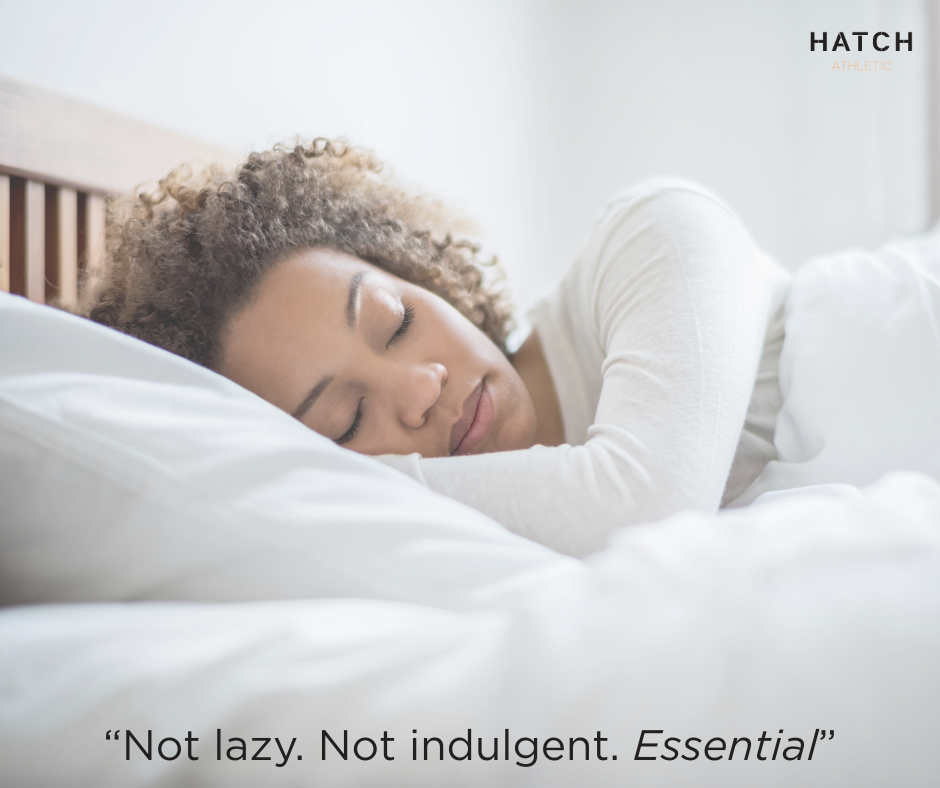Fuel for Performance: Why Female Athletes Need to Prioritise Nutrition First
Discover why under-fuelling, poor sleep, and restrictive diets can harm female athletes' hormones, fertility, and performance — and how to rebalance with smarter nutrition.

We’ve been sold the hustle: train harder, eat cleaner, push through. But here’s the truth — if you’re not prioritising sleep, none of that matters.
Especially as a woman.
Sleep isn’t a luxury — it’s a biological non-negotiable. Sleep is when your body does the hard work: repairing tissue, regulating cortisol, balancing sex hormones, and consolidating memory. It’s the most powerful form of recovery, especially during high training loads, PMS, perimenopause, or postpartum.Without it, your body gets stuck in fight-or-flight mode, hormones go haywire, and progress stalls.
Sleep plays a critical role in regulating female hormones, and equally, altered hormones can play a critical role in regulating (or disregulating) sleep. Either way, when sleep and hormones are out of balance - oestrogen, progesterone, cortisol, melatonin - there are direct knock-on effects on your:
Menstrual cycle regularity
Fertility and ovulation
Body composition
Mood and motivation
Training capacity and recovery
If your sleep is off, it could be that you'll already know about it — with symptoms like irregular cycles, increased symptoms PMS, increased anxiety, cravings, low energy, and frustrating plateaus in your training. For those in perimenopause/post menopausal stages, these symptoms may also be familiar. It's the crucial interplay of these hormones that determine our ability to perform, recover and feel great.
Increased hunger and poor appetite control (thanks, ghrelin and leptin)
Fatigue and brain fog
Lower resilience to stress
Greater inflammation and injury risk
Reduced strength, endurance, and muscle recovery
Mood swings and emotional reactivity
For those trying to conceive or regulate their cycles: sleep is foundational. No supplement, tracker, or protocol will make up for a nervous system stuck in overdrive.
You’re not alone. Most of the women we work with at Hatch aren’t sleeping 9-hour nights with lavender diffusers and no responsibilities.
That’s why we focus on consistency and quality, not perfection.
Your hormones (like cortisol and melatonin) respond best to routine. Go to bed and wake up at roughly the same time, even on weekends.
Ditch screens an hour before bed. Try blue light blocking glasses or lightbulbs. Say no to late-night WhatsApps and overthinking.
Women’s brains tend to stay “on” longer at night. Journaling what’s on your mind — or what you’re grateful for — helps you wind down and rewire stress responses. Keep a notepad by your bed if you're a 3am worrywart (like me).
Cool, dark, and clutter-free is the vibe. Think blackout blinds, a sleep mask, and no tech. Use white noise if you can, even mums of small bubs can set a quietly rumbling white noise machine that helps those brain-waves settle down without blocking out midnight calls to arms.
High quality magnesium helps with recovery and sleep depth. Herbal teas like chamomile or valerian can gently calm your system — especially in the luteal phase or the more hormonally turbulent perimenopause when sleep can get wonky.
Training hard is always encouraged at Hatch but there's training, then there's overdoing it. Different women need different amounts of rest, but we'll say it here, loud and clear - if your cycles are irregular, absent, or you're struggling with recovery or hormone related symptoms at any life-stage, it might be time to think about how frequently you're training, how early or late in the day you're training, and if you can give yourself a bigger window to come down before bed.
As tempting as it may be when you're already tired, try to reach for your last caffeinated drink at least 8 hours before bed. Alcohol free sleeps are more restorative and deep, so you might want to consider reducing intake too.
It could be that biological changes to your hormones are the root cause, and the poor sleep is a direct response - a lot of the strategies above will help to get you some better rest, even if it's not as plentiful as it once was. Hormonal fluctuations in pregnancy, postpartum, peri/post menopause are often not permanent, so try not to panic. Have faith that things may improve in time, and in the meantime you can be doing everything in your toolkit to be supporting good rest. For those nights where it's simply not happening? Don't TRY to sleep as this can sometimes make it worse , read a book, make a cup of tea, tomorrow's another day.
If you’re a performance-driven woman chasing strength, energy, regular cycles, or just the ability to get through the day with your sanity intact — prioritising sleep is your secret weapon.
Not lazy. Not indulgent. Essential.
You've got this,
Kat
For those with chronic sleep disorders, we recommend you seeking advice from your medical professional.
Aimee O'Keeffe, Performance Nutritionist
8 min read
Discover why under-fuelling, poor sleep, and restrictive diets can harm female athletes' hormones, fertility, and performance — and how to rebalance with smarter nutrition.
Discover why mood changes are so common during menopause and learn practical ways to support your mental health through hormonal shifts. Understand the role of hormones, sleep, exercise, and medical options in managing low mood, anxiety, and overwhelm.
Aimee O'Keeffe, Performance Nutritionist
6 min read
Learn how nutrition supports energy, recovery, bone health and long-term wellbeing during perimenopause and post-menopause. Practical advice for active women navigating hormonal changes, including some handy meal ideas at the end!
Kat, Hatch Founder & Women's Health Physio
4 min read
I can't believe it's come round so quickly, but we turn 1 this month, and to mark the occasion I wanted to celebrate the amazing athletes who have come through Hatch over the last year, over 80 of you.
